COSTA BRAVA
Population

Population

Popular destinations SPAIN
| Andalusia | Catalonia | Costa blanca |
| Costa brava | Costa del sol | El hierro |
| Formentera | Fuerteventura | Gran canaria |
| Ibiza | La gomera | La palma |
| Lanzarote | Mallorca | Menorca |
| Tenerife |
Population
There are no separate figures on the population of the Costa Brava. However, there are figures for Catalonia as a whole, of which the Costa Brava is a part. Catalonia has about 8 million inhabitants (2017), most of whom live in the metropolis of Barcelona.
Language
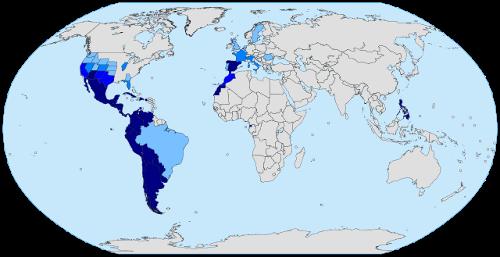 Spanish language mapPhoto: Michael Jester in the public domain
Spanish language mapPhoto: Michael Jester in the public domain
Castellano (Castilian) has been the official state language since around 1250. In other countries, Castellano is actually always called "Spanish". Castellano is a Romance language with many derivations from Latin, but also from many other languages. Spanish contains about 100 words that were brought to the peninsula by the Visigoths, among others. During the rule of the Moors, approximately 4000 words were introduced into the Spanish language. Furthermore, many words have been taken from French and Italian and more recently from English.
Examples of derivations are:
- Arabic. Alcázar. Aldea. Acequia. Alcoba
- French. monje. vinagre. menu. coqueta
- Western Gothic. guardia. ropa. tapa. espuela
- English. lider. mitin. tractor. fútbol
Castellano differs greatly from other Romance languages in some respects, especially in pronunciation. The letters of the Spanish alphabet are: a, b, c, ch, d, e, f, g, h, i, j, k, l, ll, m, n, ñ, o, p, q, r, rr, s, t, u, v, w, x, y, z.
The main dialects of Castellano are Andaluz, Leonés, Navarro, Aragonés and Asturiano.
In addition to Spain itself, Spanish is spoken in the Canary Islands and the enclaves of Melilla and Ceuta in Morocco. Furthermore, in all South American countries except Brazil, Guyana and Suriname; all Central American countries except Belize; the Caribbean islands of Cuba, Puerto Rico and the Dominican Republic; Philippines and Equatorial Guinea. In the United States, there are large Spanish-speaking communities (30 million) in Florida and California. In total, Spanish is spoken by more than 300 million people.
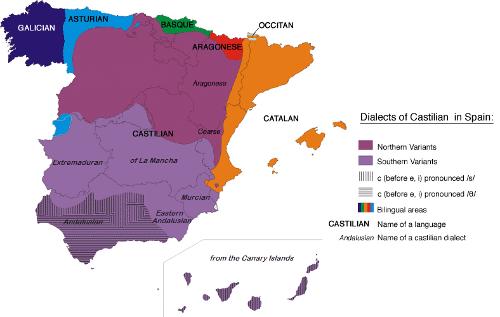 Spanish dialects mapPhoto: Stephen Shaw at the English Wikipedia CC 3.0 no changes made
Spanish dialects mapPhoto: Stephen Shaw at the English Wikipedia CC 3.0 no changes made
Important regional languages were not officially recognized until the 1978 constitution. In the Franco period it was even forbidden to speak Euskera, Gallego or Catalán.
In the Basque provinces, Basque, Vascuence or Euskera is the second official language. It is spoken on both sides of the Western Pyrenees by approximately 2.5 million people. Only a quarter of them still actually speak the language. Six deviating dialects can be distinguished and therefore a kind of standard Euskera has only been established since 1968, which is also used in official publications.
In Catalonia, Catalan or Catalán is the first official language. Catalán is a language that lies between French and Castellano and is spoken and understood by about six million people. The two main dialects of Catalán are Mallorquín and Valenciano.
Gallego or Galego is heavily influenced by Portuguese and is spoken by about 1 million people, including some in Portugal. Since Galicia is an autonomous province, all official documents are written in Spanish and Gallego.
The Gypsies or Rom normally speak Romani, a language related to Sanskrit. In Spain, Romani is mixed with Spanish and is called "Lengua Caló".
To clarify the differences between Castellano and Euskera, Gallego and Catalán, below is a sentence from the constitution about the language:
Castellano
El castellano es la lengua española oficial del Estado. Todos los españoles tienen el deber de conocerla y el derecho a usarla.
Euskera
Gaztelania da Espainiako Estatuaren hizkuntza ofiziala. Espainol guztiek jakin behar dute eta erabiltzeko eskubidea dute.
Gallego
O castelán é a lingua española oficial do Estado. Todos os españoles teñen o deber de coñecela e o dereito a usala.
Catalán
El castellà és la llengua espanyola oficial de l'Estat. Totally espanyols toes el door de conèixer-la i el dret d'usar-la.
A few words:
- English: Hey / Please / Thanks. Sorry
- Castellano: hola / por favor / gracias / perdón
- Euske: kaixo / mesedez / eskerrik asko / parkatu
- Gallego: ola / por favo / gracias / perdoa
- Catalán: hola / sisplau / gràcies / perdoni
Religion
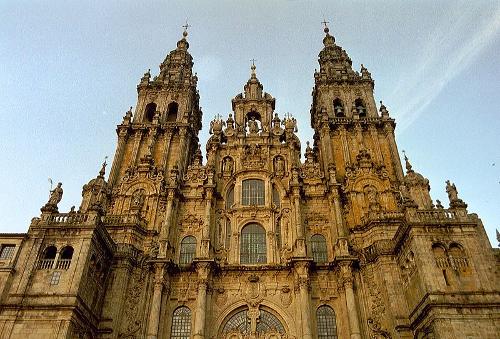 Cathedral of Santiago de Compostella, SpainPhoto: NielsB CC 3.0 Unported no changes made
Cathedral of Santiago de Compostella, SpainPhoto: NielsB CC 3.0 Unported no changes made
From the year 394, when Spain was still part of the Roman Empire, Roman Catholicism has been the state religion. It was Emperor Theodosius who took care of this. In 589 this status was reaffirmed by the Visigoth king Recaredo. In 711 Spain was conquered by the Moors and Islam was the main religion.
It was not until the early seventeenth century that the Catholic Church regained its powerful position and a close collaboration between church and state emerged. In 1931, at the time of the Second Republic, this undesirable situation came to an end. The church had become unpopular in all those centuries and this led to the death of about 6,000 clergymen in the Spanish Civil War. It was therefore not surprising that the church developed close ties with the Franco regime. Franco declared Roman Catholicism the state religion in 1939.
Thus church life was woven throughout society. It was very remarkable that the church was only allowed to appoint bishops on the recommendation of Franco. This close collaboration with the dictator made the church very unpopular among the population again. Although the Second Vatican Council demanded the separation of state and church, Franco refused to comply.
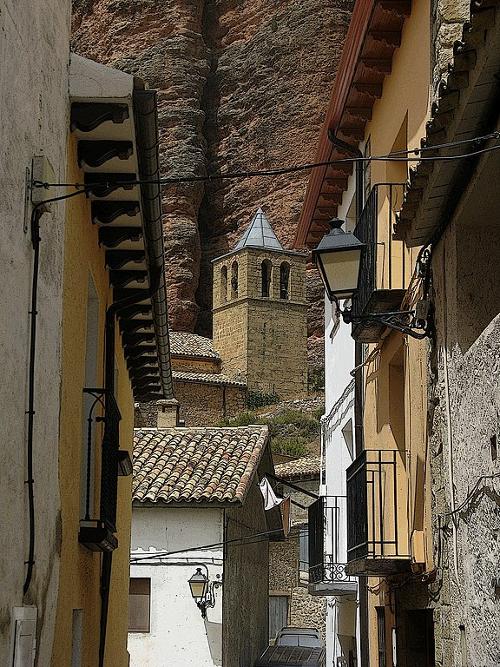 Village church SpainPhoto: Agracier-NO VIEWS CC 3.0 Unportedno changes made
Village church SpainPhoto: Agracier-NO VIEWS CC 3.0 Unportedno changes made
Only after Franco's death was the 1978 constitution reintroduced the separation of church and state and freedom of religion guaranteed. All this on the initiative of the newly appointed King Juan Carlos.
The Spanish population is approximately 95% Roman Catholic. The Roman Catholic Church comprises a total of 14 archdioceses and 53 dioceses. Together they form the eleven church provinces. The Archdioceses of Barcelona and Madrid-Alcalá fall directly under the Holy See of Rome. The primate of Spain is the Archbishop of Toledo. Approx. 870,000 people profess a faith other than Roman Catholicism, including Muslims (approx. 500,000), Jews and Protestants (approx. 70,000).
Involvement with the church has declined sharply in recent decades. More than 4 million people say they no longer adhere to any religion. The number of parish priests, monks and nuns is also declining sharply. Despite this decline, there is still massive participation in the important religious festivals. It is clear that at the moment it is more and more tradition instead of religious belief.
In the countryside there is a lot of participation in so-called "romerías", pilgrims / images to the shrine of a certain saint or to much revered images of Mary or Jesus. One of the best known is the Pentecostal romerías of Huelva, La Virgen del Rocío. Hundreds of thousands of pilgrims still flock here every year.
"Opus Dei"
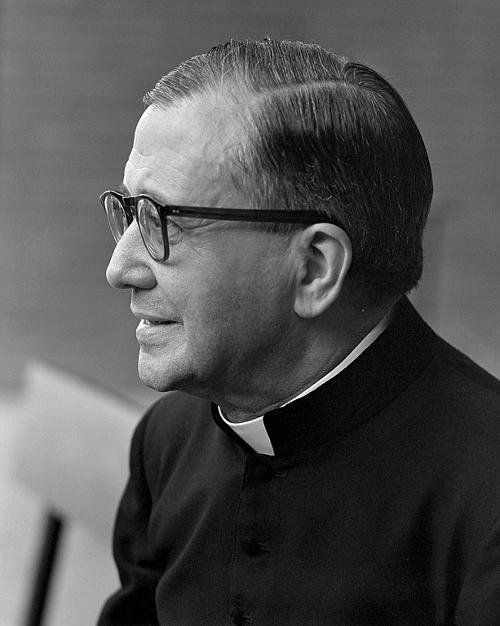 San Josemaría Escrivá, founder of Opus DeiPhoto: Oficina de Información de la Prelatura del Opus Dei en España cc-by-sa-2.0 no changes made
San Josemaría Escrivá, founder of Opus DeiPhoto: Oficina de Información de la Prelatura del Opus Dei en España cc-by-sa-2.0 no changes made
The organization "Opus Dei", also called "La Obra" in Spain, wants a better and more prosperous society, but strongly based on traditional Christian values. This organization was founded in 1928 by the priest Josemaria Escrivá de Balaguer whose maxims, the "Camino", published in 1931, serve as a guide for the supporters of the organization. He found that prosperity among the population was increasing, but that at the same time religiosity and secularisation increased.
Under the Franco regime, the movement had an increasing influence on social life, in 1941 on education and in 1957 even on the economy. The movement currently has about 80,000 members worldwide, of which about 27,000 are in Spain. With the canonization of Escrivá in 1998, Opus Dei has penetrated into the heart of the Roman Catholic Church.
A certain group, the "numerarios", live in communes and donate their incomes to the organization. This gives the organization a lot of money.
Obviously, these types of organizations receive a lot of criticism, the question of which is true. Opus Dei is also accused of taking people away from their own responsibility and people who disengage or want to disengage do not have an easy time. Furthermore, strict confidentiality is required of the members about internal affairs.
Sources
Wikipedia
theworldofinfo.com/spain
Hendriksen, Bartho / Barcelona en Catalonië
CIA - World Factbook
BBC - Country Profiles
Copyright: Team The World of Info